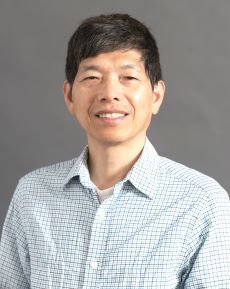 Meiqing Shi , Associate Professor
Meiqing Shi , Associate Professor
Host immune responses to fungal infection and parasite infection
Education
2000 – 2006, Postdoctoral, Immunology, University of Saskatchewan, Saskatoon, Canada
2000, Ph.D., Parasite Immunology, University of Giessen, Giessen, Germany
1988, MS, Avian Diseases, South China Agricultural University, Guangzhou, China
1985, DVM, Veterinary Medicine, Hunan Agricultural University, Changsha, China
Professional Experiences
2017 – present: Associate Professor, Virginia–Maryland College of Veterinary Medicine, University of Maryland, College Park, Maryland
2011 – 2017: Assistant Professor, Virginia–Maryland College of Veterinary Medicine, University of Maryland, College Park, Maryland
2006 – 2011: Research Associate, Faculty of Medicine, University of Calgary, Calgary, Canada
1990 – 1995: Lecturer of Veterinary Parasitology, College of Veterinary Medicine, South China Agricultural University, Guangzhou, China
1988 – 1990: Assistant Lecturer of Veterinary Parasitology, College of Veterinary Medicine, South China Agricultural University, Guangzhou, China
Research interest
The area of interest in Dr. Shi’s lab is host-pathogen interactions, with special interest in the cellular immune responses to Cryptococcus neoformans and Trypanosoma brucei, as well as their transmigration into the brain across the blood-brain barrier. Both pathogens can survive in the bloodstream and invade the brain, causing brain infections. His lab has developed a mouse model system based on intravital microscopy to study intravascular interactions of host cells with the pathogens in living hosts. In addition, his lab studies the mechanisms involved in the clearance of C. neoformans by immune cells in the infected lung and brain. The long-term goal of his lab is to understand how the pathogens evade immune responses and cause infections.
Representative Publications
-
Strickland AB, Chen Y, Sun D, Shi M. Alternatively activated lung alveolar and interstitial macrophages promote fungal growth. iScience. 2023 Apr 23;26(5):106717. doi: 10.1016/j.isci.2023.106717.
-
Liu G, Abas O, Strickland AB, Chen Y, Shi M. CXCR6+CD4+ T cells promote mortality during Trypanosoma brucei infection. PLoS Pathog. 2021 Oct 6;17(10):e1009968. doi: 10.1371/journal.ppat.1009968.
-
Chen Y, Li C, Sun D, Strickland AB, Liu G, Shi M. Quantitative analysis reveals internalization of Cryptococcus neoformans by brain endothelial cells in vivo. Cell Microbiol. 2021 Jun;23(6):e13330. doi: 10.1111/cmi.13330.
-
Liu G, Abas O, Fu Y, Chen Y, Strickland AB, Sun D, Shi M. IL-27 negatively regulates Tip-DC development during infection. mBio. 2021 Feb 16;12(1):e03385-20. doi: 10.1128/mBio.03385-20.
-
Sun D, Zhang M, Sun P, Liu G, Strickland AB, Chen Y, Fu Y, Yosri M, Shi M. VCAM1/VLA4 interaction mediates Ly6Clow monocyte recruitment to the brain in a TNFR signaling dependent manner during fungal infection. PLoS Pathog. 2020 Feb 26;16(2):e1008361. doi: 10.1371/journal.ppat.1008361.
-
Liu G, Fu Y, Yosri M, Chen Y, Sun P, Xu J, Zhang M, Sun D, Strickland AB, Mackey ZB, Shi M. CRIg plays an essential role in intravascular clearance of bloodborne parasites by interacting with complement. Proc Natl Acad Sci U S A. 2019 Nov 26;116(48):24214-24220. doi: 10.1073/pnas.1913443116.
-
Sun D, Sun P, Li H, Zhang M, Liu G, Strickland AB, Chen Y, Fu Y, Xu J, Yosri M, Nan Y, Zhou H, Zhang X, Shi M. Fungal dissemination is limited by liver macrophage filtration of the blood. Nat Commun. 2019 Oct 8; 10(1):4566. doi: 10.1038/s41467-019-12381-5.
-
Kumar D, Ristow LC, Shi M, Mukherjee P, Caine JA, Lee WY, Kubes P, Coburn J, Chaconas G. Intravital imaging of vascular transmigration by the Lyme spirochete: requirement for the integrin binding residues of the Borrelia burgdorferi P66 protein. PLoS Pathog. 2015 Dec 18;11(12):e1005333. doi: 10.1371/journal.ppat.1005333.
-
Liu G, Xu J, Wu H, Sun D, Zhang X, Zhu X, Magez S, Shi M. IL-27 signaling is crucial for survival of mice infected with African trypanosomes via preventing lethal effects of CD4+ T cells and IFN-γ. PLoS Pathog. 2015 Jul 29; 11(7):e1005065. doi: 10.1371/journal.ppat.1005065.
-
Li SS, Kyei SK, Timm-McCann M, Ogbomo H, Jones GJ, Shi M, Xiang RF, Oykhman P, Huston SM, Islam A, Gill MJ, Robbins SM, Mody CH. The NK receptor NKp30 mediates direct fungal recognition and killing and is diminished in NK cells from HIV-infected patients. Cell Host Microbe. 2013 Oct 16; 14(4):387-97. doi: 10.1016/j.chom.2013.09.007.